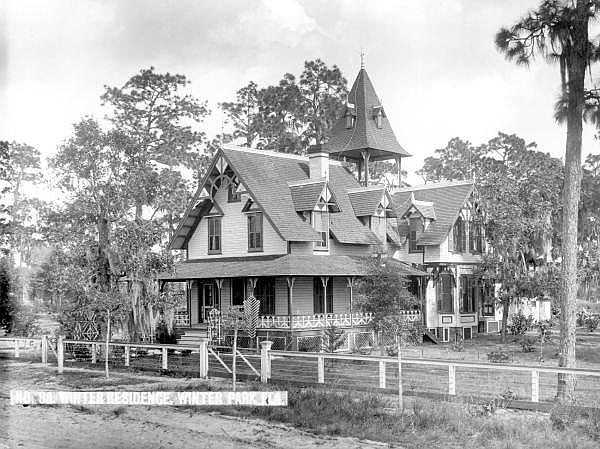- October 23, 2024
-
-
Loading

Loading

Some Winter Park news from Sept. 23, 1893 just went viral again.
A Rollins College class took social media’s “throwback” posting theme to the next level last week, treating the public to a day of tweeting and instagramming the news like it was 1893.
“Just in case anyone forgot that @WinterParkFla is capable of finishing a building #DomerickProbs,” student Evan Rogers tweeted. One hundred and twenty one years later, Winter Park’s talk of the town may seem eerily familiar.
Student groups in the class Decade of Decision: the 1890s, spent the first part of this semester researching and writing papers about the political, social, cultural and economic circumstances in Winter Park in 1893. Then they used that knowledge and reacted to an editorial in the Winter Park Advocate, a black newspaper of the time, and spent the day it was published, Sept. 23, tweeting about it.
“This was like a social drama,” said Professor Julian Chambliss. “You are yourself in 1893, but remarkably you have Twitter and Instagram, and you’re reacting to this editorial, but you are you.”
Students focused on the main historical event of the moment — the redistricting of Winter Park, cutting Hannibal Square and its black, Republican residents, from the town to the benefit of the Democrats seeking a larger voice in Winter Park’s government.
“I worked over the summer to identify what would be something that could generate a conversation and that we could capture some of the archival sources that we have and weave them across platforms and create a kind of immersive experience,” Chambliss said. “And so it was really important to find a subject that would resonate enough with contemporary audiences, that it would be interesting, but also something rooted in the period.”
The tweets read like any you’d find on the site focused on discussing today’s news, and their points of view read like those of today, too. Unlike the community members of Winter Park in 1893, the students of Rollins 2014 disagree with removing Hannibal Square from the town limits.
“People of Rollins should support Republicans and not get rid of part of the town for political gain,” Anthony Patikowski tweeted.
“Rollins, reject this redistricting on September 23! Kids like you need to stop racism in our country!” Margaret Milford tweeted.
Tweets also focused on Rollins history, tourism, the development the railroad station brought to Winter Park and the former town government being accused of malfeasance. Milford, a freshman, took bringing the past into the present even further, creating memes with photographs from the time period.
On a photo of people enjoying boating on a local lake, picturesque homes in the background, she’s placed the text, “This is a formal affair come to Winter Park.” Chambliss said it’s a great comment on tourism and the role lakes still play in recreation in residents’ lives.
But Chambliss isn’t sure whether Winter Park’s residents of 1893 would love Twitter or not.
“They had their own version of Twitter,” he said.
Many big cities had a morning and evening edition of the paper then, along with the birth of modern media happening – magazines and telegraphed news – so information traveled relatively fast, even then, Chambliss said.
Milford said she appreciates how much more quickly she can get news now, and the dialogue it creates when people can offer their views along with the news instantly.
“I feel like that connects a lot more people,” she said. “I think social media definitely does influence how fast people hear about things.”
Chambliss liked that this was a way to share some Winter Park history with a lot of people at once on a very accessible, popular platform. It’s a way to teach the public and his students.
“I think it should be done more, I mean, we’re in the 21st century now, I figure social media should play a role in a history class,” said Austin Meehan, a senior history major. “It combines the past and the present a little bit, and for me as a student it gets me more engaged and more interested in what’s going on.”